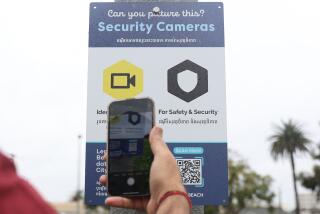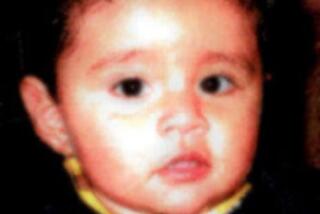Service Would Store Data on Children--Just in Case
- Share via
With the Polly Klaas murder verdict again focusing attention on missing and abducted children, it’s not surprising that dozens of companies have begun offering--for a fee--to help parents put together fingerprint and photo files of their children.
But a Newport Beach company wants to take the process a step further by storing this information on a computer capable of flooding police departments and other agencies across the country with faxes and e-mail the moment a child disappears.
“This service stores a child’s vital information and is prepared to send it out at a moment’s notice,” said Thomas Banks, chief executive of Santiago SDS Inc., the company that is launching the program.
For a $24 fee, the company will electronically store a child’s fingerprints, medical and dental records, important phone numbers and photographs. To participate, parents fill out a one-page questionnaire that, along with a photo of the child, is scanned into a computer database.
Police say that such services can be helpful, but also stress that parents can do the work themselves for free. “We recommend that parents maintain their own files with photographs, fingerprints and dental records,” said Sgt. John Desmond of the Newport Beach Police Department. Police departments and other agencies occasionally offer free fingerprinting programs at community events, said Desmond, who added that his department would rather work with a fingerprint on paper than one that is stored digitally.
But Banks said his service--called KID for Kid Identity Defense--can disseminate information faster, especially if parents are out of town when their child is lost or abducted, and can’t get home to retrieve their file.
The service won’t begin enrolling children until August or September, but Banks hopes to market it nationwide through distributors who sell Santiago’s existing line of products, which includes software used to manage medical records. The data in the KID service will never be sold, and will be encrypted to protect it from access by computer hackers, Banks said.
Banks wants KID to become “a prevention mechanism, not a recovery mechanism.” Children who are registered with the company’s service will be given KID T-shirts, KID decals to put on their shoes and KID iron-on patches to affix to their clothing.
All of these are supposed to make a would-be abductor think twice before grabbing a KID-protected child, a strategy Banks compared to putting a private security sign in front of your home.
Greg Miller covers high technology for The Times. He can be reached at (714) 966-7830 and at greg.miller@latimes.com
More to Read
Sign up for Essential California
The most important California stories and recommendations in your inbox every morning.
You may occasionally receive promotional content from the Los Angeles Times.













